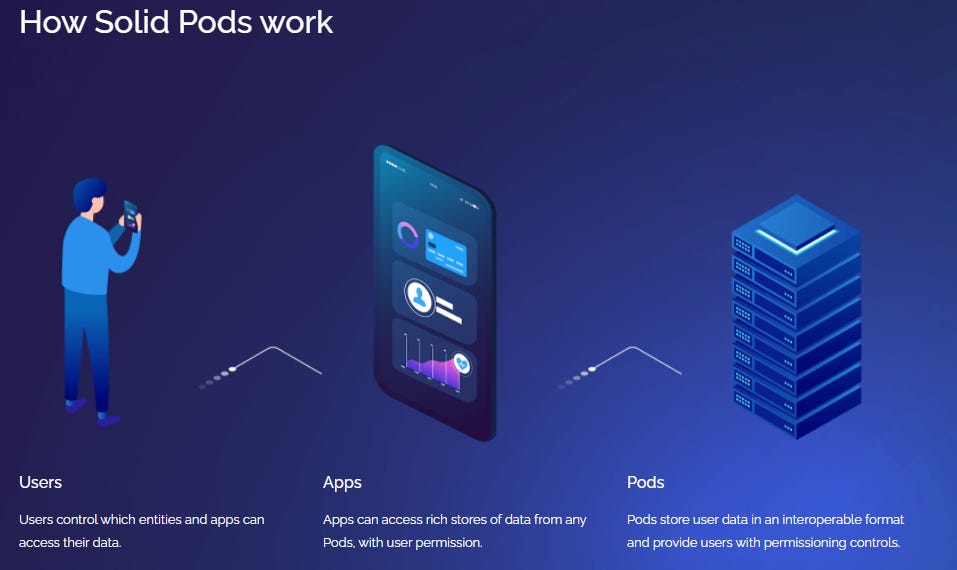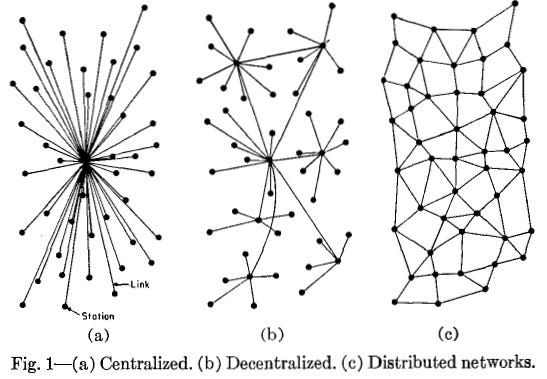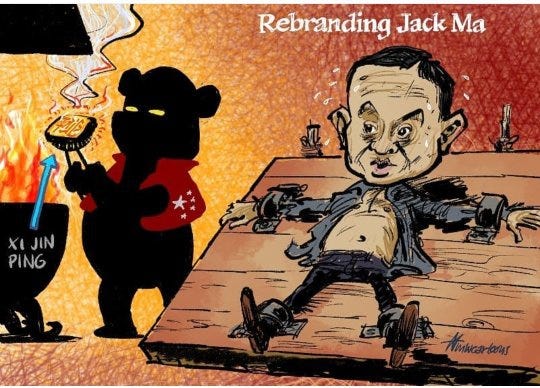Insightful newsletter of Drishtikone: Issue #221 - Reclaiming Identity
Centralized social networks with mass ownership of our data are the new colonial ventures. They enslave our identity. Reclaiming our identities will require moving to decentralized networks.
Image by daemonzzz from Pixabay
“When you have eliminated all which is impossible, then whatever remains, however improbable, must be the truth.” ― Arthur Conan Doyle, The Case-Book of Sherlock Holmes
When the Rishis declared “अहम् ब्रह्मास्मि” (Aham Brahmasmi) meaning “I am Brahman” where Brahman is the Universal Consciousness; it was an announcement that they had no identification left. For identification with anything - your nation, your gender, your family, your ideology, and in the end, your body - restricts you. It makes you work for that identity at the expense of everything else.
Those Rishis and Yogis were liberated of all identities and cycles of life. They were completely free.
The rest of us, however, are with identities. Identities that socially and psychologically, even civilizationally, define us.
When someone entraps our identities, they enslave us. What we are. What we identify with. What is important to us. And, what makes us, us!
The large tech companies with centralized platforms and data stacks of us, our families, our actions, our biologies, physiologies, finances, and all the rest of it have and are doing exactly that.
Entrapping our identities to enslave us and our communities.
You may roam around, as if free. Travel, party, love, cry, win, lose, play and read as if all is normal. But you are on a leash. Someone knows what you do. Who you are. What you want and where you will go next. If you don’t, they will send whatever is at their disposal - bots, invites, algorithms, nudges, and data pokes - to make you do what they want. You may not know it. But that is what happens.
Your identity gone. Your data points surrendered. Your future fixed. Your beliefs and ideologies gamed and restricted. You are just a little robot with the delusion of freedom.
Welcome to slavery in the 21st century.
the new worldwide web and platforms
Sir Timothy John Berners-Lee is also known as TimBL.
He is an English computer scientist best known as the inventor of the World Wide Web. He is a Professorial Fellow of Computer Science at the University of Oxford and a professor at the Massachusetts Institute of Technology.
The original creator of the Internet is not happy with how companies like Google, Facebook, and Amazon have come to control the entire internet and the data on everyone on it. He is now working on another platform that will make the current internet totally redundant.
So he has taken a break from teaching at MIT’s CSAIL labs and started a new venture called Inrupt.
He is working with other researchers and has come up with a new framework for handling and organizing Data, Applications and identities on the web. It offers better choices for people, organizations, and developers by building on existing web standards. You can learn about the Solid framework and technology at its site on MIT - Source.
Solid is open source. And really returns the power of access and data management back into the hands of the users. Here is an illustration of how it works.
The real issue with the current tech platform scenario is centralization. Our data - yours and mine - has been handed over to these tech monopolies who can do whatever they want with that data. They can confine us, screw us, enable us, help us, kill us (at least virtually) or help us. They do what makes them profits.
As long as our identities and data help them ace the next quarter they are nice to us. Or else we need to be silenced, vilified, and buried.
The way to get away from their stranglehold is to move to a framework with decentralization as the foundation. And, that is where the Federated platforms (please read our earlier issue - Issue #125 - How to create your own Social Media Ecosystem - A Guide ) come in.
When it comes to social data, the World Wide Web Consortium (aka the "W3C", the standard-setting body for the web) is working on standardized protocols to help advance the idea of the decentralized social web (again, the antithesis of a centralized service like Facebook). The primary client/server protocol within those efforts is called ActivityPub, and it is accompanied by a number of other protocols for notification delivery, social data vocabulary, etc. Solid is using these protocols, and new products are emerging that also use them in their attempts to provide online social network experiences that are similar to existing platforms such as Twitter and YouTube. (Source)
That is the issue. This is a war between centralization of data, identity, and therefore, power.
Our battle - yours and mine - is now not even about narratives anymore. It is about preserving my identity and not allow anyone to enslave it.
This is colonialism and slavery, alright.
No one is physically restraining you. But virtually, economically and socially - your identity is being restrained and enslaved just as viciously as the Europeans and Arabs enslaved Africans and Asians some centuries back.
Through the federated and decentralized frameworks - whether TimBL’s Solid pods or the ActivityPub linked platforms, we are looking at reclaiming our identity! Taking back our freedom again.
Federated networks let users pick a server to sign up with, which gives them access to the entire network spread out across many different servers. This gives users more choices for applications, policies, and community cultures. Email is an example of a federated protocol that everyone on the internet uses. (Source)
Interestingly, federation is not just for socially interacting applications but also a useful, and more importantly, a viable concept for other tech applications as well. A French company, for example, can come up with a personal data cloud offering. Cozy aims to offer your own private cloud. This full ownership of data allows you to have full control over all your data.
This is akin to what Solid is trying to provide. Your own data instance - your identity - the “Solid POD” is your hands.
Data ownership and Interoperability (via the Activity Hub protocol) are the keys to decentralization.
Here are some useful articles if you are interested.
the end of Alibaba, Ant Group, and Jack Ma
After the disappearance of Jack Ma (Source) and the mess up on the Alibaba IPO (Source), the Ant group is now restructuring with a holding company structure to appease the Chinese establishment.
Ant Group will reorganize much of its operations under the umbrella of a financial holding company for transparency at the behest of Chinese regulators, a source with knowledge of the situation told Nikkei. Its loan intermediary business and sales of mutual funds and insurance would become subsidiaries of the holding company, with Ant, the fintech affiliate of Alibaba Group, as the parent. The restructuring would also cover MYbank, an online lender to small and midsize companies, and likely Tianhong Asset Management, operator of the Yu'ebao money market fund. (Source)
This will fundamentally change the direction and structure of Jack Ma’s company. The price he and his company will have to pay for criticizing Xi Jinping.
Also, there is a lot of pressure on Jack Ma and the Ant group to share its data with the Chinese government.
China’s regulators are trying to get Jack Ma to do something the beleaguered billionaire has long resisted: share the troves of consumer-credit data collected by his financial-technology behemoth. Mr. Ma has little room to bargain after the business empire he has built over decades has landed in the crosshairs of regulators and even President Xi Jinping, partly reflecting Beijing’s concern that the flamboyant entrepreneur has been too focused on his business fortunes rather than the state’s goal of controlling financial risks. (Source)
Creating a financial holding company as opposed to being a tech conglomerate means that it will more akin to a banking company.
Bank-like companies don't command tech-like valuations. Unless, of course, you're in the booming consumer finance market in China, which is expected to hit three trillion yuan (S$612.70 billion) in volumes over the next four years. That's where credit demand is - and that's where Ant's reach is. (Source)
Now, this is if Ant Group and Alibaba is an independent company. By some accounts, the Chinese Communist Party is moving ahead with nationalizing Ant Group and Alibaba now. And the orders have come from the very top.
Meanwhile, sources have said the development is a proof of China's resolve to nationalize Alibaba. Song Qing, Internet finance industry insider, said the investigation is part of CCP plans to nationalize both Ant Group and Alibaba. "There will definitely be an outcome, now that they have started the investigation ... This is probably coming from the highest levels," he told Radio Free Asia. The suggestions are that the plan to nationalize Alibaba has come from the very top of the ruling Communist Party structure. A few days ago, the People's Daily, the official mouthpiece of the CCP, said the government's "anti-monopoly work" will lead to "better development." The paper said the party Politburo thought 'anti-monopoly work' should be strengthened to prevent the disorderly expansion of capital. (Source)
And, that would be virtually the end of Jack Ma and his entrepreneurial life at least. What has happened with Jack Ma in China is not a new thing. The Chinese regime is totalitarian and brutal in its ways.
Fan Bingbing, for example, had suddenly disappeared in 2018 and resurfaced with tax evasion charges against her.
Chinese superstar actress Fan Bingbing is back in the spotlight for the first time in almost a year, after she abruptly dropped out of sight in the wake of a massive tax evasion scandal. (Source)
Similarly, the real-estate tycoon Ren Zhiqiang also disappeared in March 2020 after criticizing Xi Jinping’s Coronavirus handling and resurfaced with corruption charges for which he was jailed for 18 years!
A Chinese billionaire who criticized President Xi Jinping's handling of the coronavirus pandemic has been jailed for 18 years on corruption charges, a court said Tuesday. Ren Zhiqiang, a retired real-estate tycoon with close ties to senior Chinese officials, disappeared in March after he allegedly penned a scathing essay that month criticizing Xi's response to the coronavirus epidemic. He was later charged with corruption-related offenses. (Source)
In China, no matter how wealthy and powerful you are, if you say anything against the government, you have no power and can be stripped off of your money pretty quickly.
the purge
Since yesterday, when we discussed how Trump had been thrown out of the tech platforms and the email services, many more platforms have banned him, his campaign, and certain affiliated online communities. The full list is available at Axios and includes Reddit, Twitch, Shopify, Twitter, Google, YouTube, Facebook, Instagram, Snapchat, TikTok, Apple, Discord, Pinterest, and Stripe (Source)
market corner: 10 quick bytes
Facebook doubled its profits in India as its revenue grew by 43% to reach $1.73B - more
Jobs that will be in demand in 2021 - more
Indian companies may raise $30 billion via offshore bond sales in 2021 - more
South Korea’s Samsung is setting up $654.36 million) display factory in Uttar Pradesh - more
Kevadia station near the Statue of Unity in Narmada district to be virtually inaugurated on 16 January 2020 - more
Karnataka farmers sell paddy to Reliance Retail above MSP - more
Hotstar now accounts for 30% of Disney+'s member base, has about 26M subscribers - more
Tesla's stock market value tops Facebook's in huge trading - more
Cities have borne the maximum brunt of the COVID-19 outbreak but they will also be key to India’s post-pandemic growth as they account for nearly 70 percent of the country’s GDP - more
All women pilots did it' - (led by Captain Zoya Aggarwal) Air India's longest direct flight lands in Bengaluru - more
nota bene
COVID VAX Rs 200 a pop: As India is setting up to launch one of the biggest vaccination drives in the world from January 16, it has been revealed that the vaccine will be available for ₹200 a vial in India. It has also been reported that the Centre has sent a purchase order with the Serum Institute of India (SII) on Monday, January 11. (Source)
Unicorn Organizing SME: Much of the business-to-business market in India remains unorganized. This means that merchants in the nation today have to travel to other cities — where all the major dealers operate — to stock up their inventory. But these merchants don’t have much leverage to negotiate, so they struggle to find best value for money and access to a wider selection of catalog. Udaan, co-founded by three former Flipkart executives, is solving this problem by connecting small retailers with wholesalers and traders. The startup today serves more than 3 million retailers and small and medium-sized businesses and it has signed up thousands of brands, including Coca-Cola, PepsiCo, Boat Lifestyle, Micromax, HP, LG, ITC, HUL and P&G. Its valuation has now jumped to over $3B, and it means Udaan has raised over $1B from investors. (Source)
AI to nab Capitol Attackers: In the aftermath of the attack on the US Capitol, local law enforcement agencies are trying to nab all the perpetrators involved in the incident. As more details of the violence at the Capitol emerge, the police are employing Artificial Intelligence (AI) to track the rioters. A controversial facial recognition application by Clearview is reportedly being used by authorities to track people involved in the attack which took place on Wednesday. Many of the perpetrators were seen clicking selfies, and live streaming the incident as the attack took place. This has made the job of the police easier. (Source)
A Fifth of Britain had COVID: One in five people in England may have had coronavirus, new modeling suggests, equivalent to 12.4 million people, rising to almost one in two in some areas. It means that across the country as a whole the true number of people infected to date maybe five times higher than the total number of known cases according to the government’s dashboard. (Source)
How Brain Navigates: A new study reveals how your brain navigates places and monitors someone else in the same location. The findings suggest that our brains generate a common code to mark where other people are in relation to ourselves. As COVID cases rise, physically distancing yourself from other people has never been more important. Now a new UCLA study reveals how your brain navigates places and monitors someone else in the same location. (Source)
video corner: train across Europe
There is a romance when it comes to train journeys. The one train journey that has always caught my attention is the one across Europe. From Paris to Moscow, via Berlin. More than 3.000 kilometres in 36 hours and two nights in an RZD night train. It is - The Trans European Express. You can also read about it here - Night Train from Paris to Moscow - the Transeuropean Express
Today’s ONLINE PAPER: Check out today’s “The Drishtikone Daily” edition. - THE DRISHTIKONE DAILY
SUPPORT DRISHTIKONE: If you consider our work important and enriching and would like to contribute to our expenses, please click on the button below to go to the page to send in your contribution. You can select the currency (for example, INR or USD, etc) and the amount you would like to contribute. - CONTRIBUTE TO DRISHTIKONE.
If you like this post - please share it with someone who will appreciate the information shared in this edition
If you like our newsletter, please share it with your friends and family









AWESOME